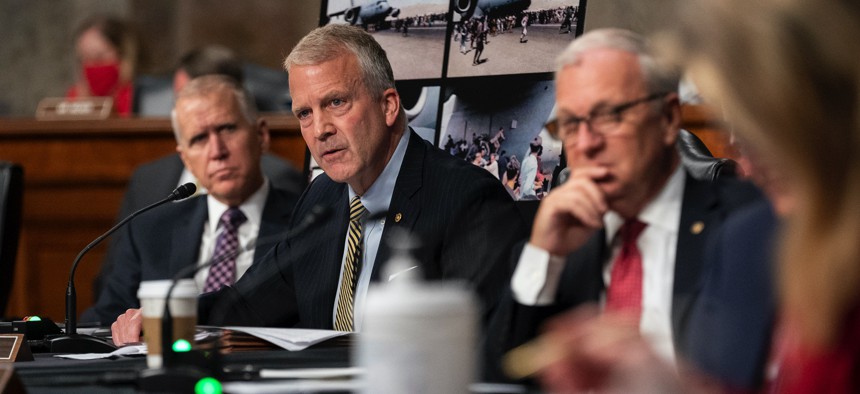
Sen. Dan Sullivan, R-Alaska, speaks during a Sept. 28 Senate Armed Services Committee hearing on Afghanistan. The committee has prioritized hearings about the recently concluded Afghanistan war over confirming top Pentagon officials. Photo by Stefani Reynolds-Pool/Getty Images
The 9/11 Commission Said National Security Vacancies Were A Problem. Biden’s Pentagon Is ‘Far Worse’
The Senate is “falling far behind” as Armed Services and Foreign Relations Committees consider 14 nominees this week.
Senate committees this week are considering more than a dozen national security and foreign policy officials in what experts hope is an effort to pick up the pace on a sluggish confirmation process that is dangerous for the country.
Many national-security positions remain vacant nearly nine months into the Biden administration due to a historically slow-moving confirmation process. But quickly getting people on the job after a presidential transition is critical to the country’s safety. The 9/11 Commission Report found that the lack of confirmed national security appointees on Sept. 11, 2001, hurt the nation’s ability to respond to the terrorist attacks.
By Oct. 5, 2001, the Bush administration had 34 Pentagon officials confirmed, according to data provided by Loren DeJonge Schulman, who leads the research, analysis and evaluation team at the Partnership for Public Service. Today, at the same point in his presidency, Biden has just 21.
“We are far worse off compared to the Bush administration,” Schulman said. “If the Senate considers part of its role to be national-security responsibilities, they are falling far behind.”
The Senate Armed Services Committee is considering seven nominees at two confirmation hearings on Tuesday and Thursday. Those hearings will be the first for Defense Department political appointees since July, though the committee has considered two military officers to lead combatant commands since then. The Senate Foreign Relations Committee also met twice on Tuesday to consider seven nominees, including ambassadors to Kosovo, Bosnia and Herzegovina, Andorra, Austria, and Bahrain.
“It is critical for our national security and foreign policy that the Senate move forward with these qualified, experienced nominees as quickly as possible,” White House spokesperson Chris Meagher said. “While hearings are a step forward, these nominees cannot get to work until confirmed on the Senate floor. We hope the Senate Republicans who are using delay tactics – even for nominees with strong bipartisan support – to slow the confirmation process will stop their obstruction and let these public servants help support our armed forces and advocate for American interests abroad.”
Confirmation hearings in the Senate Armed Services Committee were stalled in part because lawmakers decided to hold hearings about Afghanistan withdrawal when they returned to Washington after a month-long August break, a Republican aide told Defense One.
“Afghanistan is a huge reason there hasn’t been anything,” the aide said.
The Senate Armed Services Committee held two open hearings on Afghanistan last month, but Ranking Member Sen. Jim Inhofe, R-Okla., has called for additional oversight hearings with Gen. Scott Miller, the last commander of the Resolute Support Mission in Afghanistan, and Colin Kahl, the defense undersecretary for policy.
A Senate Armed Services Committee aide agreed that Afghanistan oversight took precedence over nominations, but that it did not cause a “significant setback.” The committee is now on track and working through nominations at its normal pace, the aide said.
“Neither SASC nor DOD has a logjam with its nominees,” the aide said. “The committee is working at an expected pace. We’re on schedule.”
But experts outside of government denied that this is a normal pace. The Senate has confirmed just 21 officials that Biden nominated to serve at the Defense Department, lagging behind the past three administrations, according to data from the Brookings Institution. Biden will hit 300 days in office on Nov. 16. In each of their first 300 days, the George W. Bush Administration had 41 confirmed officials at the department, the Obama administration had 29 and the Trump administration had 26.
The problem is the Senate, not the White House, Schulman said. At this point in their presidencies, Bush, Obama and Biden had nominated 39, 31, and 39 people respectively. But Bush and Obama had 34 and 26 people confirmed, compared to just 21 under the Biden administration. Biden, however, is ahead of this point in Trump’s presidency, where he had nominated 39 people, but only had 15 confirmed.
It’s not clear whether these hearings will accelerate the confirmation process on Capitol Hill. Presidents historically see the highest number of confirmations between their 200th and 300th day in office, according to Kathryn Dunn Tenpas, a nonresident senior fellow at the Brookings Institution. Even though Biden is in a period where past presidents have not had much luck pushing their team through Congress, Tenpas speculated that the current administration might not fit these historical trends since it has been behind overall.
“The optimistic part of me thinks there will be a regression to the mean and a surge to the 200-to-300-day point,” she said. “Maybe they’re just getting more pressure from people at the Defense Department and stakeholders of the Defense Department” that “you have to start confirming these people.”
The pace of confirmation is even worse at the State Department, where Biden has submitted 99 nominations and has just 20 confirmed officials, according to the data from Schulman. For comparison, Bush had 101 confirmed officials at State, Obama had 90 and Trump had 30. In August, Ken Salazar became the first confirmed ambassador in the Biden administration.
The very slow rate at the State Department is due, at least in part, to Sen. Ted Cruz, R-Texas, who blocked every State Department nominee over concerns about the Nord Stream 2 gas pipeline built by Russia and the lack of sanctions imposed on Moscow by the Biden administration.
Sen. Josh Hawley, R-Mo., has also said he’ll hold up “every single civilian nominee” at the State and Defense Departments until Defense Secretary Lloyd Austin and Secretary of State Antony Blinken resign over the Afghanistan withdrawal.
It’s not just Republicans. Sen. Elizabeth Warren, D-Mass., previously blocked two Defense Department nominees over their ties to industry, but lifted the holds in July when they agreed to not return to industry for at least four years after leaving for the Pentagon.
Acting officials can be extremely qualified and competent, but they don’t command the same authority as someone selected by the president, said Schulman, who likened it to having a substitute teacher. Those in an acting capacity are not well positioned to launch new priorities or sign off on major policy changes.
“No matter how great these folks are, things are going to be slowed down because we have acting officials,” she said.
There’s also a legal reason to get people permanently in their seats. Under the Vacancies Reform Act, someone may only serve in an acting capacity for 300 days after a presidential transition, a deadline that Biden will face next month. The time limit is paused while the Senate considers the appointee if a nomination is made.
It’s also critical to get people into national security roles more quickly to keep the country safe, according to the 9/11 Commission report, which found that a shortened presidential transition in 2000 “hampered the new administration in identifying, recruiting, clearing, and obtaining Senate confirmation of key appointees.” It recommended that Congress speed up the process of national security confirmations, but data shows that timelines are only growing.
One idea for how to get national security officials on the job faster is to decrease the number of Senate-confirmed positions, which is now at about 1,200 roles, Schulman said. Jobs that currently require action from the Senate could either become roles for career civilians or remain political appointments that the president could make unilaterally.
Another idea is to limit Congressional recesses until they have gotten through a certain number of confirmations, Tenpas said. During the first 300 days of the Biden administration, Congress will spend about 90 days in their home districts, Tenpas said. However, establishing some threshold of confirmations that Congress must consider before they get a break would establish an incentive to move faster, she suggested.
“It’s a completely pie-in-the-sky idea…[but] there’s just a lot on their plate,” she said.






